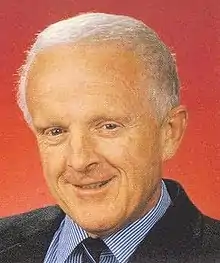John Button
John Norman Button (30 June 1933 – 8 April 2008) was an Australian politician, who served as a senior minister in the Hawke and Keating Labor governments. He was notable for the Button car plan, which involved modernising Australia's car industry by reducing tariffs and government protection.[1]
John Button | |
|---|---|
 | |
| Leader of the Government in the Senate | |
| In office 11 March 1983 – 24 March 1993 | |
| Prime Minister | Bob Hawke Paul Keating |
| Preceded by | John Carrick |
| Succeeded by | Gareth Evans |
| Minister for Industry and Commerce | |
| In office 11 March 1983 – 24 March 1993 | |
| Prime Minister | Bob Hawke Paul Keating |
| Preceded by | Andrew Peacock |
| Succeeded by | Alan Griffiths |
| Leader of the Opposition in the Senate | |
| In office 7 November 1980 – 11 March 1983 | |
| Preceded by | Ken Wriedt |
| Succeeded by | Fred Chaney |
| Senator for Victoria | |
| In office 18 May 1974 – 31 March 1993 | |
| Succeeded by | Kim Carr |
| Personal details | |
| Born | 30 June 1933 Ballarat, Victoria, Australia |
| Died | 8 April 2008 (aged 74) Melbourne, Victoria |
| Political party | Australian Labor Party |
| Spouse(s) | Dorothy 1984 - 2000, Joan Grant |
| Children | 3 |
Biography
Button was born in Ballarat, Victoria,[2] and was educated at The Geelong College and the University of Melbourne[3] where he graduated in arts and law. He became a lawyer with Maurice Blackburn & Co and later a barrister in Melbourne[4] and became active in the Australian Labor Party from the late 1950s. In the 1960s he joined a group of other middle-class Labor activists, such as John Cain, Barry Jones, Richard McGarvie, Frank Costigan and Michael Duffy, known as "the Participants" whose objective was to end Left-wing control of the Victorian branch of the Labor Party.[5]
In 1963, Button was invited to run as the Labor candidate for the seat of Chisholm, which was safely held by Wilfrid Kent Hughes. Party members recall that at the declaration of the poll Kent Hughes stood up and said in patrician tones, "It was a fair fight." To which Button replied, "It was neither fair nor a fight. I gained a swing of one: my mother."[6]
In 1970, the Participants formed an alliance with the federal Labor leader Gough Whitlam[7] and the President of the Australian Council of Trade Unions, Bob Hawke, to bring about intervention in the Victorian branch by the Federal Executive. Button became part of the interim Advisory Council which took over the branch after intervention, and in 1974 he was elected to the Australian Senate as a strong supporter of Whitlam.
Button remained a backbencher during the remaining 18 months of the Whitlam government. He was elected to the Opposition Shadow Ministry in 1976 and was elected Deputy Labor Leader in the Senate in 1977. From 1980 to 1983 he was Leader of the Opposition in the Senate and Shadow Minister for Communications. He was also a member of the Labor National Executive.
A close friend of Labor Leader Bill Hayden, Button decided during 1982 that Hayden could not lead the party to victory at the election due in late 1983. When Liberal Prime Minister Malcolm Fraser called a snap election in February 1983, it was Button who told Hayden that he must resign immediately to make way for Bob Hawke. Button tapping Hayden on the shoulder would later be compared to Bill Shorten switching his support from Julia Gillard to Kevin Rudd in 2013. Button did not live to see this comparison as he died in 2008.
In 1983, when Hawke became Prime Minister, Button became Minister for Industry and Commerce, a post he held until 1993. During this period Button carried through major changes in industry policy, lowering tariffs and reducing other forms of protectionism. This caused large job losses in manufacturing industry and provoked bitter opposition among Labor's trade union base.
Button was responsible for the Button car plan, which reorganised the Australian car industry in an attempt to make it competitive without tariff protection. One component of the plan was the sharing of models by local manufacturers, for example, Holden shared models with Toyota, and Ford shared models with Nissan. However, badge engineering proved unpopular from buyers, who preferred original models to their rebadged versions, and with manufacturers themselves.[8]
Button resigned from the Senate on 31 March 1993. In retirement he remained active in Labor affairs and published several volumes of amusing memoirs. He led a number of trade missions, joined company boards and served as a professorial fellow at Monash University.[9] His son, James, is a prominent journalist.[10]
Death
John Button died on 8 April 2008 from pancreatic cancer.[11]
References
- "Former federal Labor minister John Button dies". The Sydney Morning Herald. Retrieved 8 April 2008.
- "BUTTON, John Norman (1932–2008)Senator for Victoria, 1974–93 (Australian Labor Party) | The Biographical Dictionary of the Australian Senate". Retrieved 10 June 2020.
- "Former Labor minister John Button dies". The Age. 8 April 2008. Retrieved 10 June 2020.
- "Former Labor minister John Button dies". The Age. 8 April 2008. Retrieved 10 June 2020.
- "BUTTON, John Norman (1932–2008)Senator for Victoria, 1974–93 (Australian Labor Party) | The Biographical Dictionary of the Australian Senate". Retrieved 10 June 2020.
- developer@themonthly.com.au (7 May 2008). "John Button, 1933–2008". The Monthly. Retrieved 10 June 2020.
- "Whitlam, the 1960s and the program". Inside Story. 16 December 2013. Retrieved 10 June 2020.
- "Union ... and demarcation". The Age. Fairfax Media. 26 May 2000. Archived from the original on 6 July 2011. Retrieved 10 March 2008.
- "Former Labor minister John Button dies". The Age. Retrieved 8 April 2008.
- "James Button". The Wheeler Centre. Retrieved 18 February 2018.
- "Former federal Labor minister John Button dies". livenews.com.au. Retrieved 8 April 2008.
Bibliography
- Button, John (1994), Flying the kite: Travels of an Australian politician, Sydney: Random House. ISBN 0091828724.
- Button, John (1996), On the loose, Melbourne: Text Publishing. ISBN 1875847359.
- Button, John (1998), As it happened, Melbourne: Text Publishing. ISBN 1875847499.
- Weller, Patrick (1999), Dodging raindrops: John Button, a Labor life, Sydney: Allen & Unwin. ISBN 1865081361.
- Button, James (2012), Speechless: A year in my father's business, Melbourne: Melbourne University Press. ISBN 9780522858587.
External links
- Button, James (May 2008). "John Button, 1933–2008". The Monthly.
- James Button talk at ANU's National Centre of Biography about his "accidental" biography of his father Speechless: A Year in My Father's Business (2012), 31 July 2014.
| Political offices | ||
|---|---|---|
| Preceded by Andrew Peacock |
Minister for Industry and Commerce 1983–1993 |
Succeeded by Alan Griffiths |
| Preceded by John Carrick |
Leader of the Government in the Senate 1983–1993 |
Succeeded by Gareth Evans |
| Party political offices | ||
| Preceded by Ken Wriedt |
Leader of the Labor Party in the Senate 1980–1993 |
Succeeded by Gareth Evans |
